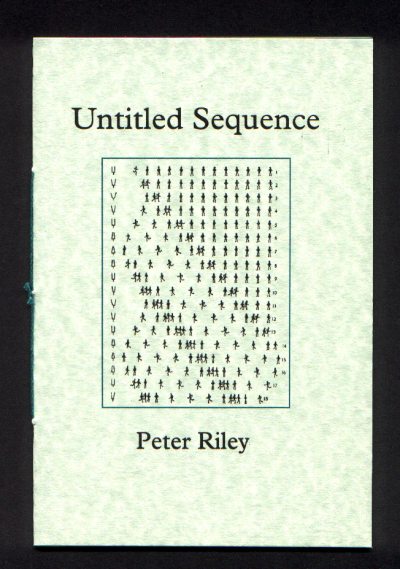 |
13x21 cm, 16 pages, 250 gsm green Strata card cover,
hand sewn with green twist.
The cover image is from an old physics book showing a longitudinal wave. ISBN 1 903090 16 4 Click here to read an interview with Peter Riley conducted by Keith Tuma. See below for author's note and extract. |
Author's note:
A set of poems which in its first incarnation was the fifth and last section, subtitled 'Germany', of The Linear Journal, which was published by Grosseteste Review Books in 1973. Its reading implies some acquaintance with this book, to which the first poem is an explanatory link.
Written 1970 / abandoned 1972 / rewritten 1977 / a few leaks plugged 1999.
Thanks are due to Peter Robinson for drawing my
attention to this work, which he published in an issue of Perfect Bound
in
1977.
I trust in the heart-work it becomes
a steady and calm series like adding
the alphabet together, thick stones and
thin stones one after another,
the avenue, the planes.
For the words spoken among us
are still cooling in the sky
And the lights go out
letter by letter
each claim dies
as day folds in.
Black windows, and the depot lamp.
And, really, not such a big night,
not so strong and not so dangerous
hardly worth traducing, leave it
alone. It works its own passage.
Night of thieves and military acts,
we are parked here. Lines scored
on the concrete simulating stonework,
fooling no one. Keep on adding
A to B and the world is back home.
The tour is not going well or badly,
the tour is just going. We have not
whistled in the wings. We have spoken
a language we barely comprehend but in
fits and starts, but we have spoken it
as it stands. We have murdered it.
So now I feel the need for a particular drink.
It?s called something like flughaven mit schmalz
no, that's ridiculous, so I don't get one, and
the local bearer of Hölderlin's language
looks at me
in blank dismay. But it's a wonderful concoction
I was treated to in Lübeck last week: a
white beer
mixed with strawberry-juice in a large bowl-shaped
glass
and a black church out of the window.
The brightness in the chalice
focuses into the street outside,
where our transport lies dormant.
But all that was really damaged
was the fiction of ourselves,
shattered. The ruins of empire strewn
around us were works of art compared
to what we knew we weren't qualified
to be. The buildings are now all razed and
grass grows in their spaces, for a time.
Ruins of a war, ruins
of a reconstruction scheme, the vast
acreage of wonderful rubbish lying
still in the day, meeting the light
where the mind stops urging itself
O the bright world is harder than horn.